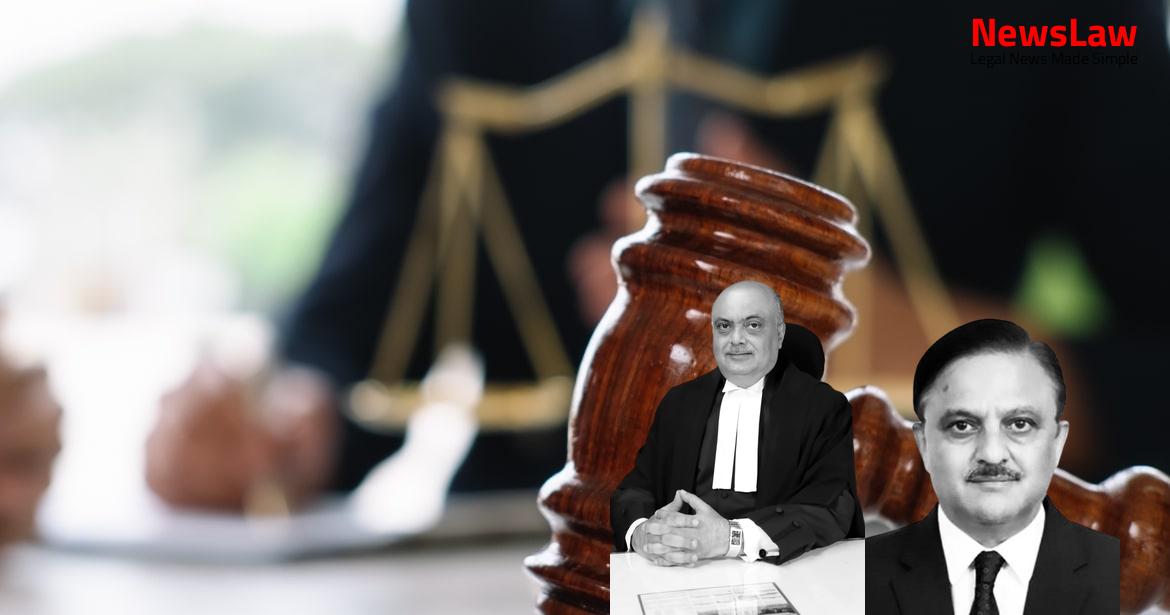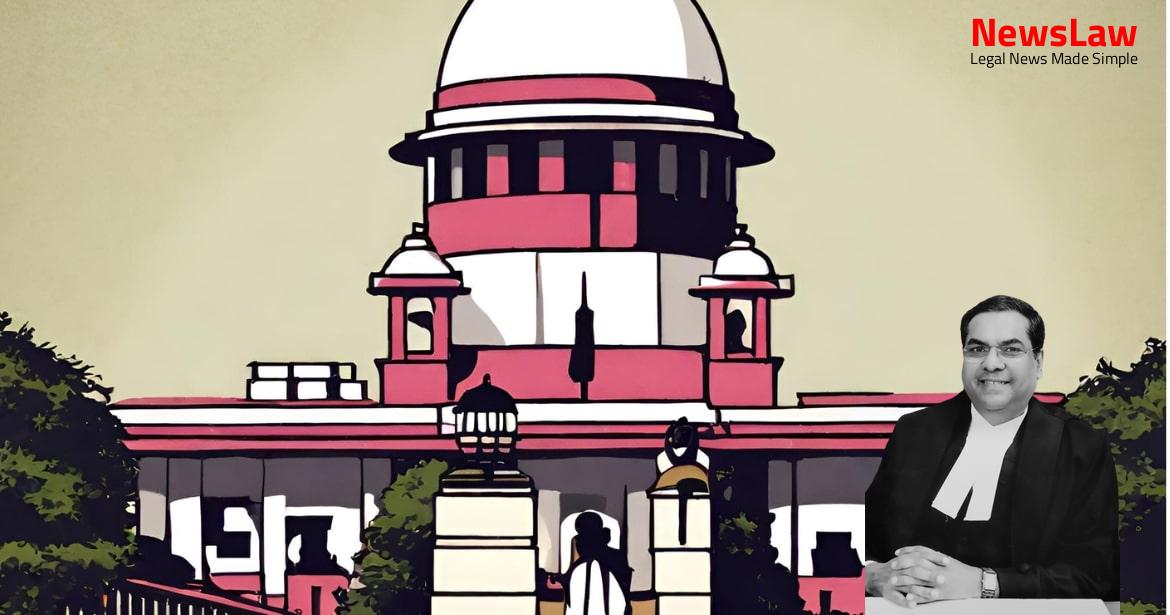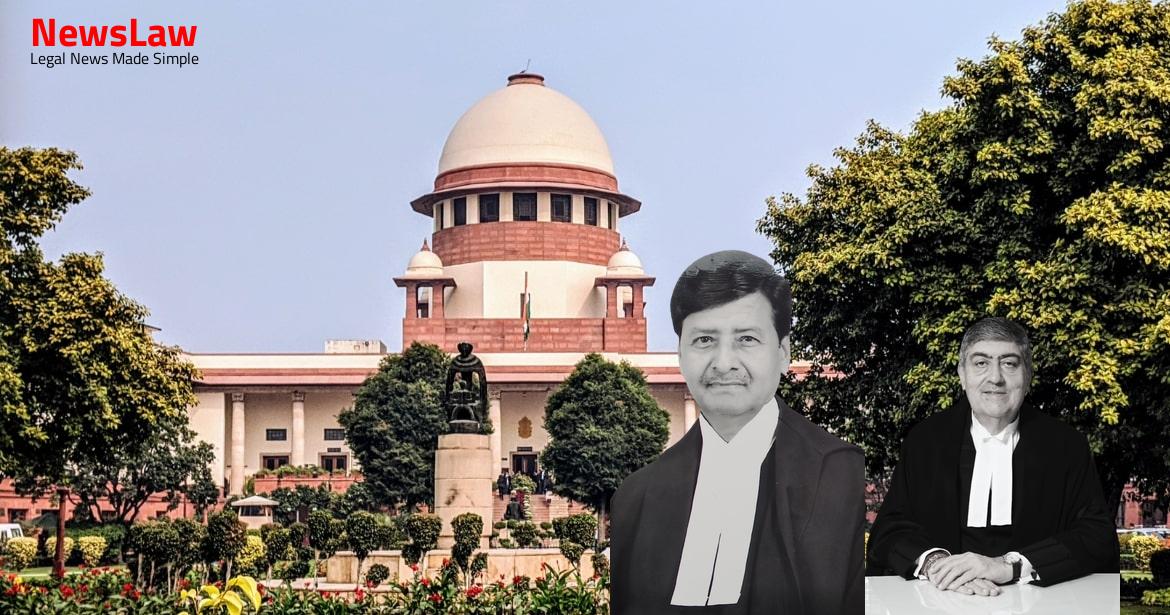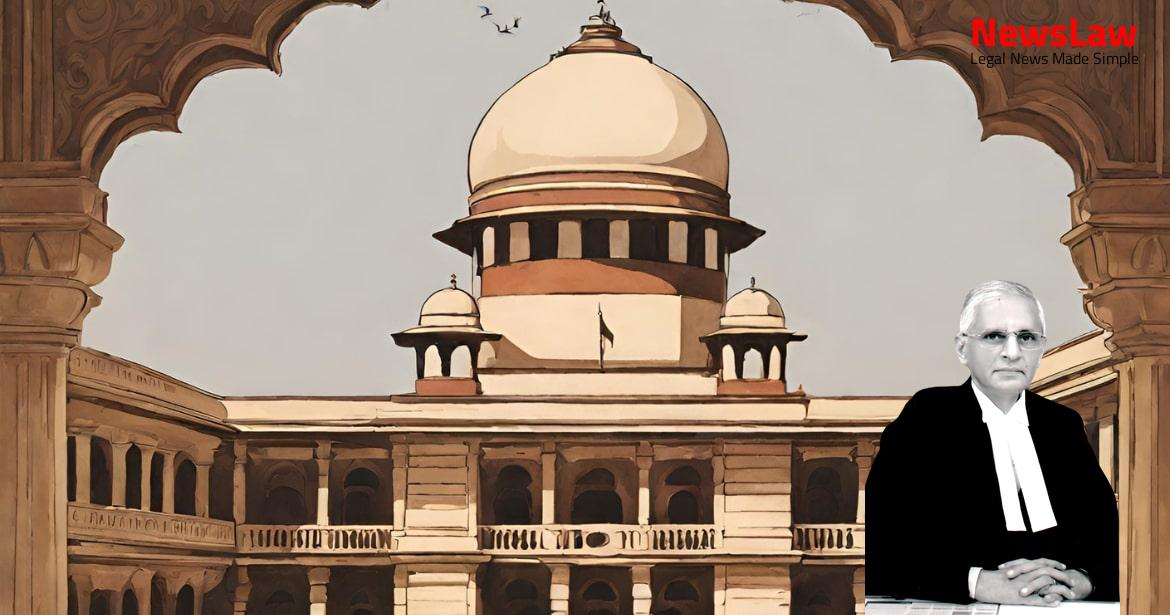The Supreme Court of India recently delivered a crucial judgment in a case involving financial irregularities. The judgment resulted in the restoration of the removal order against the concerned individual. This decision marks a significant milestone in upholding justice and integrity in administrative proceedings.
Facts
- The respondent sold 9 shops at very low prices compared to the market value without following the auction procedure.
- The respondent filed four writ petitions in the High Court which were decided by a common judgment on 22.02.2008.
- The respondent preferred a contempt petition which was dismissed, and the Special Appeal filed against it was also rejected.
- The respondent had suspension orders stayed by the Single Judge in 1983.
- Irregular and doubtful entries were made by the respondent during a period of demotion.
- The Departmental Promotion Committee found the respondent not fit for promotion during his period of suspension.
- The respondent had moved the High Court in a writ petition challenging his removal.
- The respondent was suspended in 1979 for various irregularities.
- Charges were proven against the respondent in 1985 leading to his removal from service.
- The DPC found the respondent suitable for a certain period but not for another due to pending enquiries.
- Suspension order quashed, respondent entitled to remaining salary and period counted towards pension
- Found fit for promotion in 1980-1981 but denied due to pending enquiry, entitled for consideration for promotion and benefits
- Removal order passed on 28.09.1993 after due procedure, serious charges found partly/fully proved
Also Read: Property Tax Dispute: Avenue Supermarts Limited vs. Municipal Corporation
Arguments
- The appellant argued that there was a miscarriage of justice as despite five charges being proved documentarily, the High Court interfered on hyper-technicality.
- The Division Bench did not provide reasons of its own for agreeing with the Single Judge that the enquiry was based on no evidence and findings were perverse.
- The counsel for the appellant asserted that the respondent’s financial irregularities and insubordination were admitted, justifying the actions taken against him.
- The counsel urged the Court not to interfere in the matter based on the admitted misconduct of the respondent.
- The learned Single Judge found that despite the Enquiry Officer’s conclusion of no loss being proved, the charge was still found proved, which was deemed improper.
- The Order of the learned Single Judge and upheld by the Division Bench was considered not deserving of interference.
- The counsel urged that the appeals should be dismissed based on the above reasons.
Also Read: Case Summary: Legal Implications for Directors in Company Affairs
Analysis
- The High Court’s role is supervisory, not appellate, and should not reevaluate evidence
- In cases where findings are based on some legal evidence, adequacy or reliability of evidence cannot be challenged in a writ under Article 226
- The High Court cannot interfere if a disciplinary authority accepts findings based on evidence, detailed reasons for punishment are not required in such cases
- A finding of fact can be challenged only if no evidence or a clearly perverse finding is recorded
- The High Court should not act as a court of appeal, reevaluating evidence in a departmental inquiry
- An error of law on the face of the record can be corrected by a writ, not an error of fact
- The High Court fell into error by analyzing evidence as an appellate court
- Punishment can be imposed based on findings in an inquiry report without elaborate reasons by the disciplinary authority
- The Removal Order considered the whole material and made it clear the Authority was satisfied with the punishment
- The Division Bench tried to make a distinction without proper justification from established law
- Documents not alleged to be non-existent/false/fabricated; no challenge to the existence of evidence
- A writ can be issued if tribunal erroneously refused admissible evidence or erroneously admitted inadmissible evidence influencing findings
- High Court cannot correct a finding based on insufficient evidence; should not reevaluate evidence to question the tribunal’s conclusions
- High Court should not review and reassess evidence in setting aside dismissal orders
- Findings of fact from evidence appreciation by lower courts/tribunals are not reopened in writ proceedings
- No violation of natural justice principles observed in the case
- Enquiry process followed with witness testimonies and document exhibits, resulting in certain charges being proved against the delinquent employee
- High Court can interfere if proceedings are inconsistent with natural justice rules or statutory procedures, or if conclusions are wholly arbitrary or capricious
- Removal Order’s discussion is found to run contrary to the record on areas of agreement, lacking in-depth analysis of relevant evidence
- Principles of natural justice cannot be reduced to hard and fast formulae.
- High Court cannot review evidence and arrive at an independent finding on the evidence in a writ petition under Article 226.
- Orders should not be declared void for any and every violation of natural justice.
- Infirmity greater than ordinary is needed in a tribunal’s order to justify interference.
- Punishment must shock the conscience of the court for interference to be warranted.
- In exceptional cases, appropriate punishment can be imposed by recording cogent reasons.
- If Disciplinary Authority accepts findings, no elaborate reasons are required for imposing punishment.
- High Court should not interfere unless the decision-making process shows illogicality, procedural impropriety, or shocks the conscience of the court.
- Distinguishing between violation of natural justice and a facet of natural justice is crucial.
- High Court should not act as a court of appeal in departmental enquiries against a public servant.
- Examination under Article 226 depends on the context and circumstances of each case.
- Rule of audi alteram partem should be examined from the standpoint of fair hearing and prejudice.
- Court is not to substitute its decision for that of the administrator in reviews.
- Enquiry jurisdiction, procedure, and natural justice rules must not be violated for a fair hearing.
- Proper hearing must be distinguished from no hearing in cases of alleged procedural violations.
- Validity of orders should be tested on the touchstone of prejudice in cases of violation of a facet of natural justice.
- Observance of requirements like prior notice/hearing may not always be feasible in certain cases.
- Evolution of the rule of post-decisional hearing in compliance with natural justice in specific scenarios.
- National interest or security considerations may warrant deviation from the rule of audi alteram partem.
- Disclosure of material for certain actions may not always be advisable in the interest of the State.
- No arbitrariness or perversity found in the punishment awarded to the respondent
- Disciplinary Authorities should engage better with the representations/submissions of delinquent employees when imposing major punishment
- The learned counsel for the respondent could not refute charges of non-handing over of full charge, appointing persons without permission, and delayed money return
- Fair opportunity was given to the respondent to present his version
- Minor deficiencies in the process did not cause prejudice to the respondent
Also Read: Land Allotment Transparency: Setting Precedent for Equitable Distribution
Decision
- The Impugned Judgment is quashed and set aside.
- The Removal Order dated 28.09.1993 is restored as passed by the Disciplinary Authority.
- The appeals are disposed of with the above terms.
- Payments, if any, already made to the respondent in the interregnum, shall not be recovered due to the respondent’s retirement and age.
Case Title: THE STATE OF RAJASTHAN Vs. BHUPENDRA SINGH (2024 INSC 592)
Case Number: C.A. No.-008546-008549 – 2024



